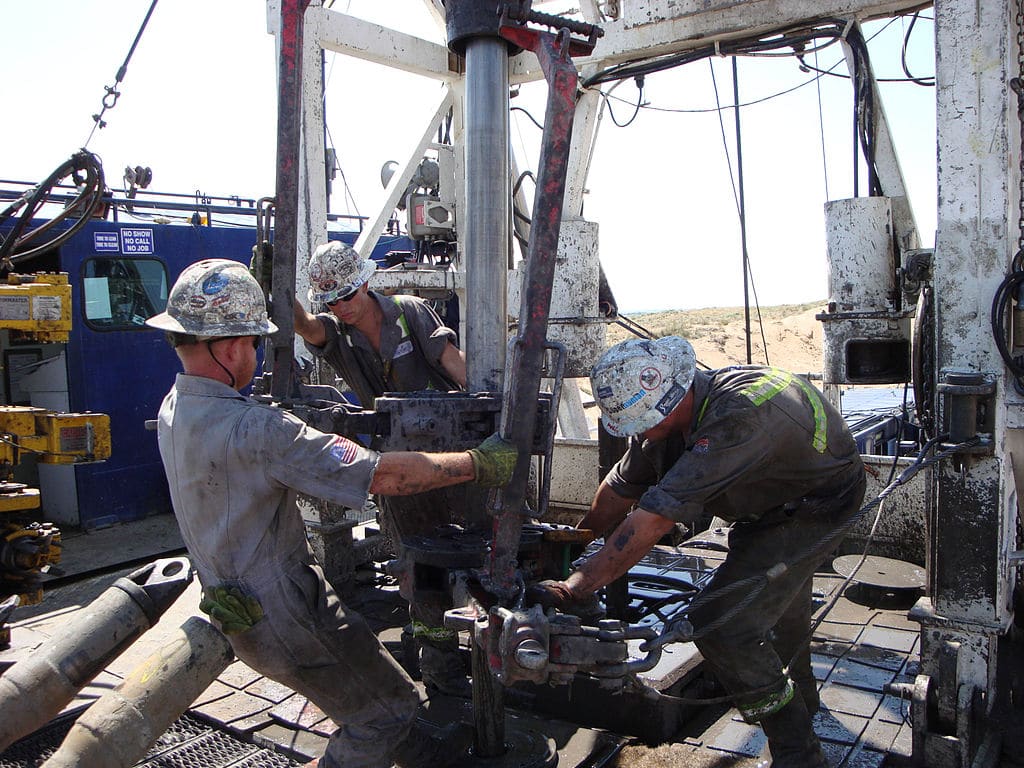U.S. oilfield workers are facing a big problem, and it’s not just the depressed prices in the worldwide oil markets.
Those who have jobs, especially the lowest level and dangerous jobs in the oilfields, are at high risk of being stiffed in a variety of ways. And they’ve started to fight back.
Five years ago, when the price of oil was high and fracking operations were ramping up throughout Pennsylvania, North Dakota, Oklahoma, Colorado and other states, there were plentiful stories about oilfield workers, many with minimal experience, pulling down six figure incomes. But even though the industry is known for paying high wages, the big paydays are more often due to the total number of hours worked, sometimes with workweeks exceeding 100 hours.
And these workers are very likely to be victims of “wage theft,” a denial of wages by employers wrongly classifying them as exempt from overtime, or paying them flat salaries regardless of the number of hours worked, or reneging on production bonuses.
Still, the money was rolling in, and industry watchers say that workers, if they even knew they were being cheated, were likely to turn a blind eye to the practices.
Now that many of those workers are idle, they’re speaking up and demanding the pay that they should have received.
The U.S. Department of Labor is on the case. Since 2012, more than 1,100 investigations of industry employers have recovered more than $40 million for more than 29,000 workers nationally according to the DOL.
In 2015, the DOL settled a case against oilfield services giant Halliburton for $18 million dollars. The Department found that the company cheated more than 1,000 workers –field service representatives, pipe recovery specialists, drilling tech advisors, perforating specialists and reliability tech specialists – by not paying them the required overtime.
In March the DOL announced that it found violations of the Fair Labor Standards Act’s overtime provisions affecting more than 2,500 employees at four companies: Jet Specialties, Frank’s International, Viking Onshore Drilling and Stream-Flo USA. The Department said employees at these companies were owed $1.6 million in back wages.
The Way It’s Always Been Done?
The Department of Labor began investigating claims of wage theft in the northeast region in 2012, at the height of the Marcellus Shale boom. Within a year, investigations spread west when it became clearer that wage violations were widespread throughout the industry, says Robin Mallett, a DOL Wage and Hour Division district director in Houston.
Mallett tells DeSmog she’s seen wage violations in the oil and gas industry across all companies —large and small. She stopped short of saying that workers in oil and gas are stiffed more than other industries, but she did say that oil and gas has a very large number of vulnerable workers.
“What we see in oil and gas is a lot of contingent workers, moving from job site to job site. We look at the industry and pay practices and how industry may be set up. The pay structure in oil and gas is fissured, and there’s a lot of subcontracting, with one big company paying another who pays another who pays another until you get to the oilfield workers. The lower you go, the more likely there will be violations, because the money flows through a chain.”
Mallet said the investigations show a pattern of industry violations. These include classifying employees exempt overtime requirements and then failing to pay an overtime premium regardless of how many hours they work, and failing to include bonus payments workers have received as part of their regular rates of pay when calculating how much overtime is due.
Mallet tells DeSmog she saw deliberate and inadvertent misclassification of oilfield laborers as managers, even though DOL regulations say job titles do not indicate exempt status in order to deny workers overtime pay.
“We see a lot of explanations from employers we’ve investigated saying ‘this is just how things have always been done in the industry.’” Mallet said. “But it’s not clear when the practices started, or why.”
Mallet admitted that with a small number of DOL investigators, “we’re just making a ripple in changing industry practices.”
#Oil industry cheating its workers in creative ways, now facing lawsuits https://t.co/Io0rCfDgc6 #ableg #cdnpoli pic.twitter.com/AzGCltdLz3
— DeSmog Canada (@DeSmogCanada) June 21, 2016
An increasing number of oilfield workers aren’t waiting for the government to act, and instead are suing their employers for back wages.
Chris Burks, an attorney with the Sanford Law Firm in Little Rock, Arkansas, is currently working on 85 Fair Labor Standards lawsuits. He tells DeSmog there’s been a spike in oil and gas workers suing for back wages now that the boom has gone bust.
“During the boom the money is so good that many of these workers, if they knew they were being cheated, didn’t care,” Burks says.
“They were making upwards of sixty grand a year, but working 120 hours a week, but they were thinking, ‘what’s the alternative?’ When things go south in the industry, that’s when they start to realize they need to act (to get the money they’re owed).”
Burks says the wage violation problems at bigger energy companies usually involve employee misclassification. He adds that a variety of wage violations, including nonpayment or miscalculation of bonuses and not paying overtime, are extremely common in small startups.
“These wildcatters spring up fast and they don’t pay attention to wage and hour laws,” Burks says.
Brian Gonzales, a Colorado attorney representing oil field workers’ wage theft claims, says many of these companies are also cheating the government.
“When they misclassify workers as independent contractors, or don’t pay them the overtime they’re due, that cheats the state out of payroll taxes and unemployment insurance that a company is supposed to pay,” Gonzales says.
Gonzales says the problem is often not a company’s deliberate avoidance of labor and wage laws, but an ignorance of them.
“Many practices, like paying a worker a flat day rate no matter how many hours they work, have been common in the industry for decades,” Gonzales says, adding that the problems became worse with the fracking boom and the proliferation of startups in the past five years.
Tough Jobs
Laborers in oil and gas don’t don’t get to keep a 9-5 schedule — not in a business that runs 24-7. And many jobs in oil and gas production, in addition to being volatile, are arduous and dangerous.
In 2012, the job search site CareerCast ranked oil rig worker as one of the worst professions, based on work environment, stress, and hiring outlook, just behind journalist.
Workers in the industry are starting to speak out, cautiously and sometimes anonymously, due to the fear of retaliation.
Jack, a retired oilfield worker in the Rocky Mountain region, spoke to DeSmog about decades of wage abuse. He refused to be identified by his real name due to fear of retaliation on a family member who still works in the oilfields.

Working as a production hand and driller on drilling rigs for thirty-five years until he was disabled in 2010 with a work-related injury, Jack claims many “creative” ways his employers cheated him.
“Clear into the 1970’s if you were working on a drilling rig you made sure who you were working for to make sure they could and would pay you and then the first time a paycheck was even late you quit and got another job because it was very common for companies to start going broke, steal their workers’ wages, and then just go out of business.”
Jack recounts countless promised bonuses that were never paid.
One type is called a “bottom hole bonus,” which is a promise to pay workers anywhere from $5 to say $25 per day for every day they worked at the end of the well or the job.
“But if you quit or got fired before the job was completed the worker did not receive any bottom hole bonus. Sounds simple enough except it was a common practice to ride workers until they quit. Or the company fired them before the end of the job so they didn’t have to pay the bonus,” Jack tells DeSmog.
And the lowest level jobs in the oilfield don’t have written contracts, something that companies can knowingly exploit when it comes to paying their employees.
Jack says the most common form of wage violation is being paid a monthly salary instead of being paid for the actual hours worked. “The oilfield runs 24 hours a day, 7 days a week, and 365 days a year, and once you start, you have have to keep drilling and or casing the well because if you stop you lose everything you drilled and maybe even the entire drill string. And there is no telling what might befall the operation so there is no telling how many hours you might have to work.”
Jack and his crew were once forced to work 24 hours straight but were not paid overtime because of the creative way the company split up the week and the pay period. “You can work 12 hours a day for 7 days in a row and only have 4 hours of overtime. And it might seem impossible but I personally watched one man work 72 hours straight.”
Jack and industry watchers say oilfield workers are not guaranteed breaks, even for lunch.
Changes Coming?
Attorneys Burks and Gonzales say with increased scrutiny by the DOL and the spike in wage theft lawsuits, large and small oil and gas companies will end long-held industry practices of skirting wage and hour laws.
“The wave of oilfield wage theft claims is cresting,” Gonzales says. “Within a few years I think we’re going to see significant industry reform.”
Image: Oilfield workers in Colorado. Credit: Wikimedia/National Institute for Occupational Safety and Health
Subscribe to our newsletter
Stay up to date with DeSmog news and alerts







